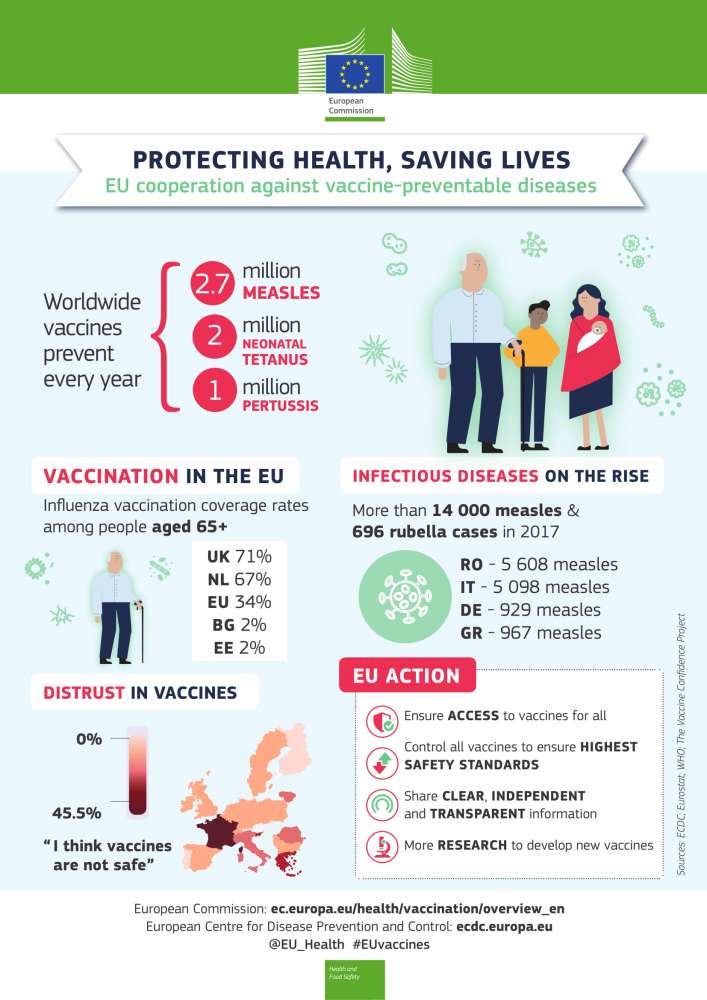Although vaccinations are not mandatory in Cyprus, immunization coverage is very high, a European Commission report found.
According to 2017 Ministry of Health data covering children 17-24 months of age, 97% of children were covered with a diphtheria, tetanus and pertussis vaccine (DTP3), while 90% were covered against measles, mumps and rubella.

As a result of the high immunization coverage, no measles cases were reported during 2015 and 2016 in Cyprus and only eight cases during the period from February 2017 to January 2018.
The report found that the high immunization coverage rate in Cyprus is mainly due to several incentive schemes, including:
- Provision of vaccines free of charge to all children in the public sector, regardless of their nationality or socioeconomic status. Children who are asylum-seekers or refugees living in government-organized accommodation are also vaccinated free of charge by the Ministry’s medical and public health services. Newly arriving refugees are immunized with some basic vaccines such as DTaP and IPV within 48 hours of their arrival.
- A significant percentage of children are also immunised by their private paediatrician. In this case the cost is paid out-of-pocket or covered by the parents’ private health insurance.
- Cooperation between the public and private sectors to promote vaccination. Every year a campaign is organized to inform not only health professionals but also children and their parents about the benefits of vaccination.
- The Vaccination Coverage Intervention Action is undertaken annually to ensure that all children at primary schools (public and private) are vaccinated according to the recommended programme, after the consent of their parents. More specifically, at the beginning of each school year health visitors check all pupils’ vaccination cards to ensure that they are vaccinated according to the recommended programme; in cases of incomplete vaccinations, they inform the parents or guardians of the importance of, and the necessity to proceed with, the vaccination of their children. In April of the same school year the vaccination cards are rechecked in order to assess the result of this intervention. Children can also be vaccinated at schools.
It is estimated that 42% of children are vaccinated in the public sector and 58% in the private sector.
Reasons for not vaccinating -misinformation
According to a 2015 Health Ministry survey, the main reasons reported by parents for not vaccinating their children were “child’s sickness” (67%), followed by “lack of vaccine” (9.8%), “lack of time” (7.6%), “lack of interest” (6.5%), “limited information” (3.3%), and “other reasons” (8.7%). Despite the high rates of vaccination, there is still room for improvement. Approximately 2% of the population rejects vaccination.
For influenza vaccination, there is no evidence on barriers or facilitators. However, barriers might include possible ignorance of the existence of the vaccine and the importance of vaccination against influenza, particularly for older people, as well as misinformation and the anti-vaccination movement. Facilitators are likely to include the free-of-charge provision of the vaccine and the information provided for the population by the services of the Ministry of Health and private doctors.
The report comes against the backdrop over conspiracy theories and misinformation campaigns which claim that vaccinations lead to health problems and even autism.
Today, more than 100 million children are vaccinated annually against diseases such as diphtheria, tetanus, pertussis, tuberculosis, polio, measles, and hepatitis B. Vaccination prevents an estimated 2.5 million deaths worldwide each year and reduces disease-specific treatment costs, including antimicrobial treatments (prescribed for viral infections).
Despite its brilliant track record, several EU and neighbouring countries are currently facing unprecedented outbreaks of vaccine-preventable diseases due to insufficient vaccination coverage rates. Unequal access to vaccines and the waning of public confidence in vaccination are a cause for concern and a major challenge for public health experts.
Adult vaccination – free of charge
Regarding adult vaccination against influenza, the Ministry of Health, following recommendations from WHO and the European Centre for Disease Prevention and Control, recommends vaccination of those belonging to the following high-risk groups:
- citizens over 65 years
- residents in nursing homes and patients in long-term care institutions
- children and adults with chronic lung disease or cardiovascular disease
- people with chronic kidney disease
- people with chronic metabolic disease, including diabetes mellitus
- people with HIV infection
- people with neurological disease
- immunosuppressed individuals
- people with sickle cell anaemia or other haemoglobinopathies
- children and adolescents who require long-term aspirin therapy
- pregnant women after the first trimester of pregnancy
- people working or living in places where the aforementioned high-risk groups live
- health workers.
According to Health and Hospital Statistics (Cyprus Statistical Service, 2015), around 13000 adults (belonging to the above-mentioned high-risk groups) are vaccinated every year in the public sector. According to the European Commission, recent data show that influenza intensity is low in Cyprus compared to most other EU/EEA countries.
How to get vaccinated:
The vaccines used in the public sector are centrally purchased through a tender by the pharmaceutical services of the Ministry of Health and are provided free of charge to all children regardless of income, socioeconomic status and nationality.
The seasonal influenza vaccine is also provided free of charge to all persons over 65 who apply to public hospitals. These people, regardless of whether they are entitled to free medical care or not, can apply for vaccination directly at hospitals or health centres, using their identity card to confirm their age.
For other age groups, vaccination against influenza is provided free of charge only to those people who are eligible for free health care in the public sector. The total cost of vaccines and vaccination services provided by the public sector is borne exclusively by the Ministry of Health.







